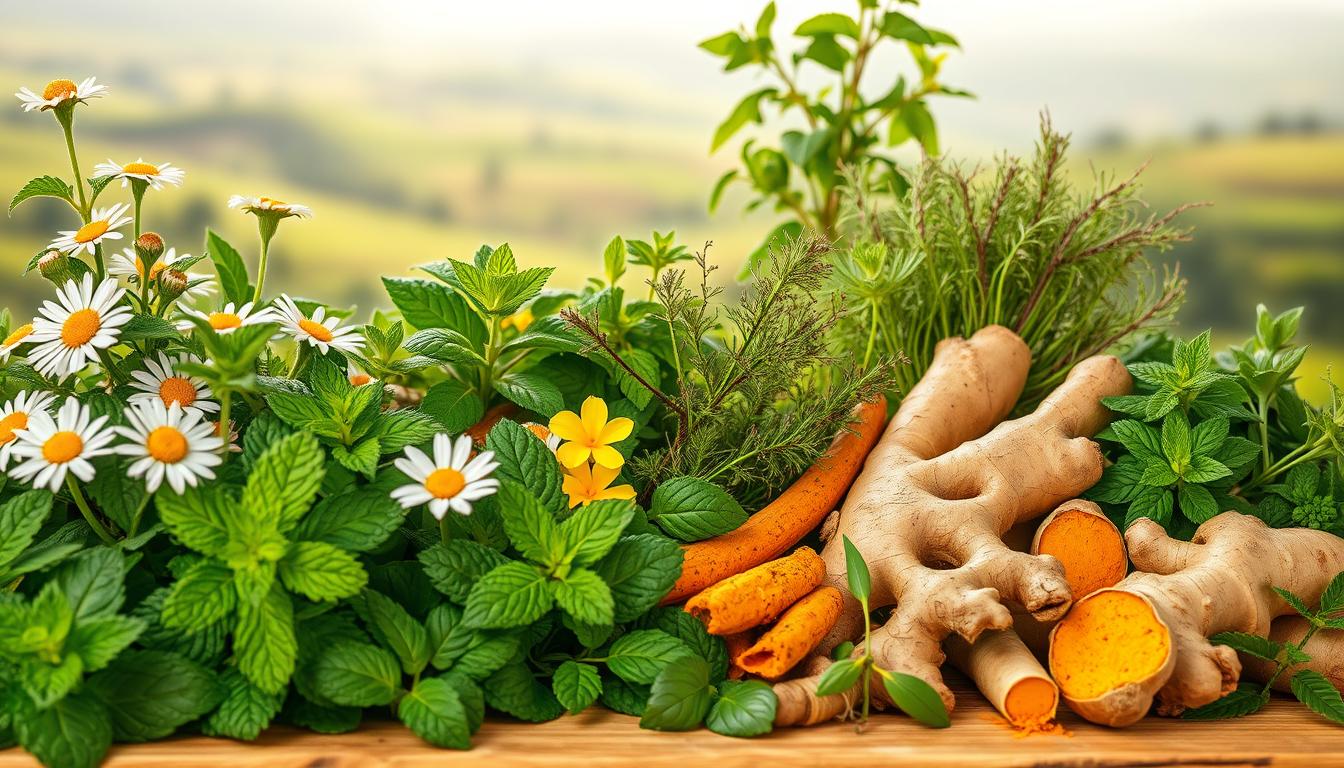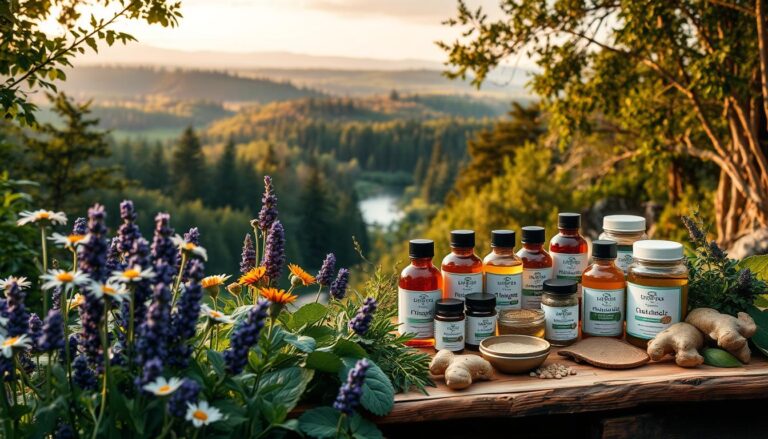Benefits Natural Herbs: How They Improve Digestion
Table of Contents
Ever felt that rumble in your stomach? It’s a sign something’s off. Digestive issues can ruin your day, making you feel tired and uncomfortable. Natural herbs can help, offering a gentle yet effective way to improve your digestion.
Benefits Natural Herbs have been used for centuries to boost gut health. They can calm inflammation and help balance good bacteria in your gut. These herbs are more than just trends; they’re backed by centuries of traditional healing.
Learning how these herbs work can help you manage your digestion better. Adding certain herbal remedies to your diet can support your body’s natural digestion. This can lead to better overall health.
Key Takeaways
- Natural herbs offer holistic support for digestive health
- Herbal remedies can help balance gut microbiome
- Different herbs target specific digestive concerns
- Traditional healing practices validate herbal effectiveness
- Natural supplements provide gentle, sustainable solutions
Understanding Digestive Health and Natural Solutions
Your digestive system is more than just a food processor. It’s a home for trillions of organisms that are key to your health. Almost 80% of your immune system lives in your gut, making digestive health vital for your well-being.
The world of gut health affects many parts of your body. It impacts your immune system and even your mental clarity. Botanical extracts and medicinal plants are powerful helpers for this delicate balance.
The Role of Gut Health in Overall Wellness
Your gut microbiome does more than just digest food. It’s crucial for:
- Immune system strength
- Mental health and mood
- Nutrient absorption
- Hormone balance
Common Digestive Issues and Their Impact
Many people face digestive problems that change their daily lives. Common issues include:
- Bloating
- Constipation
- Acid reflux
- Irritable Bowel Syndrome (IBS)
Why Natural Remedies Matter
Alternative medicine offers gentle ways to improve digestive health. Herbal treatments can help without the side effects of synthetic drugs. A 2023 study showed that ginger may ease stomach issues and lower acid, highlighting the power of natural extracts.
Natural remedies are often cheaper and more holistic in treating digestive problems.
By using natural methods to care for your digestive system, you can boost your health and life quality.
Benefits Natural Herbs for Digestive Wellness
Explore the amazing world of holistic healing with plant-based therapies. These can greatly improve your digestive health. Natural herbs are a gentle yet effective way to support your gut.
Your digestive system can greatly benefit from organic herbs. They work well with your body’s natural processes. For thousands of years, these botanical remedies have helped keep digestion optimal.
- Ginger: Speeds up stomach emptying and reduces digestive discomfort
- Peppermint: Relaxes intestinal muscles and alleviates bloating
- Fennel: Helps manage Irritable Bowel Syndrome symptoms
- Chamomile: Provides natural relief for indigestion
The magic of these herbs comes from their unique properties. Carminative herbs like fennel and peppermint can ease gas and discomfort. Lemon balm, used since 60 A.D., helps with stress-related stomach issues.
Adding these natural herbs to your daily life can boost your digestive health. You can use them in teas, supplements, or cooking. Plant-based therapies offer a natural way to keep your gut healthy.
Nature provides powerful solutions for digestive wellness, waiting to be discovered in the healing properties of herbs.
To get better results, you can benefit from the benefits of this nutritional supplement
The Power of Bitter Herbs in Digestion
Bitter herbs are nature’s secret for better digestion. They have been used for centuries to help with digestion and gut health. Your body reacts well to bitter tastes, starting important processes that help you digest food better.
How Bitter Flavors Activate Digestive Processes
When bitter herbs touch your taste buds, they start a chain reaction. Digestive bitters make your body produce key digestive enzymes. These include:
- Amylase for breaking down carbs
- Lipase for fat digestion
- Protease for protein processing
Popular Bitter Herbs and Their Uses
Many herbal remedies are known for their digestive benefits:
| Herb | Digestive Benefits |
|---|---|
| Dandelion Root | Liver support, promotes healthy digestion |
| Gentian | Intense bitter herb, stimulates digestive juices |
| Artichoke Leaves | Supports liver function, aids slow digestion |
| Burdock Root | Supports microbiome, rich nutritional profile |
Timing and Application of Bitter Herbs
For the best results, follow these tips:
- Take bitter herbs 10-15 minutes before meals
- Use liquid tinctures or herbal teas
- Start with small doses and gradually increase
Digestive bitters can transform your gut health, offering a natural approach to supporting your body’s intrinsic digestive processes.
Essential Herbs for Stomach Comfort
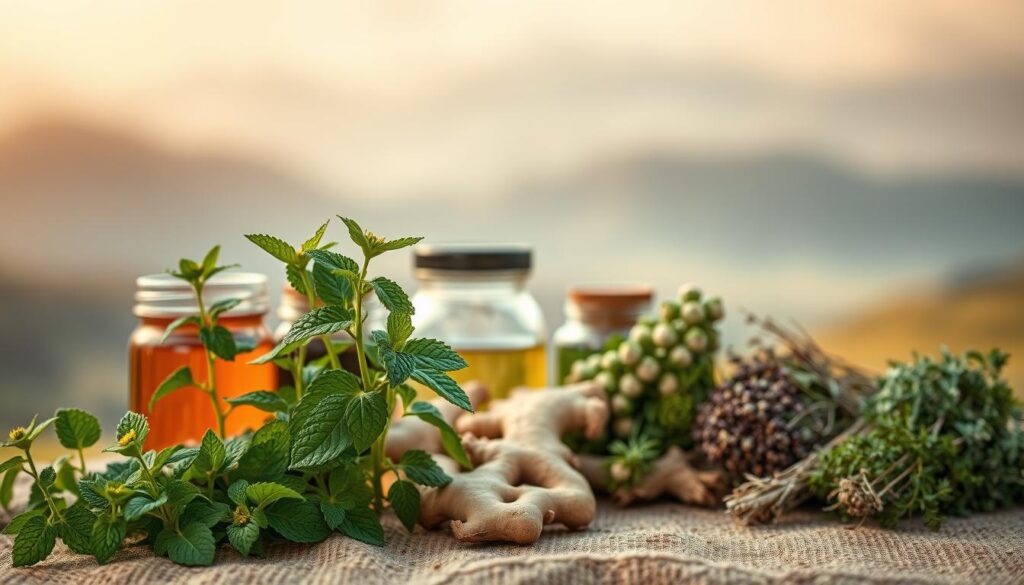
Exploring natural supplements for digestive health can change your life. Medicinal plants offer powerful solutions for stomach issues. They provide gentle and effective relief.
Several key herbs are known for their stomach-soothing properties:
- Ginger: A centuries-old remedy that speeds up stomach emptying and reduces bloating
- Fennel: Excellent for managing Irritable Bowel Syndrome symptoms
- Peppermint: Contains menthol to relax intestinal muscles
- Chamomile: Provides soothing properties for indigestion
These natural remedies can help your digestive system in many ways:
- Herbal teas
- Capsule supplements
- Cooking spices
- Essential oil extracts
| Herb | Primary Benefits | Recommended Intake |
|---|---|---|
| Ginger | Reduces bloating, speeds digestion | 1-2 grams daily |
| Fennel | Relieves gas and constipation | 1 teaspoon seeds daily |
| Peppermint | Relaxes digestive muscles | 1-2 cups tea daily |
| Chamomile | Manages indigestion | 1-2 cups tea daily |
Always talk to your healthcare provider before starting any new herbal regimen. This is especially important if you have pre-existing medical conditions or are taking medications.
Polyphenols: Nature’s Digestive Enhancers
Explore the world of alternative medicine and learn how polyphenols boost your digestive health. These plant compounds are crucial for holistic healing. They offer great benefits for your gut and overall health.
Understanding Polyphenol Types
Polyphenols are special nutrients found in plants. They are divided into several types:
- Flavonoids: Found in fruits and vegetables
- Phenolic acids: Common in berries and nuts
- Stilbenes: Prevalent in grapes and red wine
- Lignans: Abundant in seeds and whole grains
Supporting Gut Bacteria Naturally
Your gut microbiome loves these compounds. Polyphenols feed good bacteria, helping your digestive system stay balanced.
| Polyphenol Source | Gut Health Benefits |
|---|---|
| Green Tea | Reduces inflammation, supports microbiome diversity |
| Dark Chocolate | Increases beneficial bacteria populations |
| Berries | Enhances gut barrier function |
Top Dietary Polyphenol Sources
Boost your digestive health with these foods rich in polyphenols:
- Berries
- Green tea
- Dark chocolate
- Nuts
- Herbs and spices
Adding these natural digestive enhancers to your diet is a big step toward better gut health. It’s all about using alternative medicine and plant-based therapies.
Herbal Teas for Digestive Support
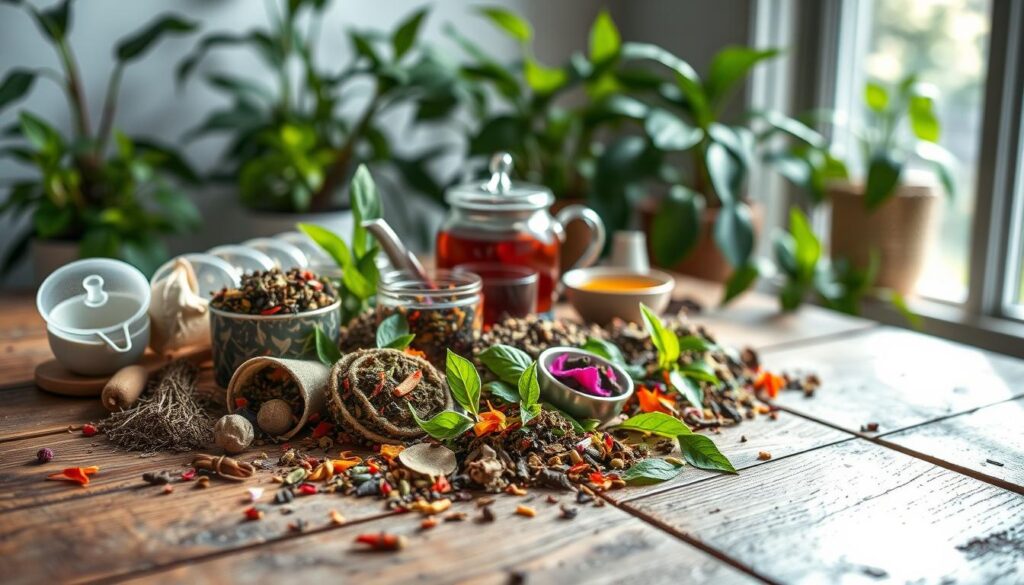
Discover the power of organic herbs in supporting your digestive health through healing herbal teas. Natural wellness starts with understanding how these ancient remedies can improve your gut health and overall well-being.
Herbal teas offer remarkable benefits natural herbs can provide for digestive comfort. Let’s explore some of the most potent digestive support options:
- Peppermint Tea: Effectively treats indigestion and alleviates abdominal pain associated with irritable bowel syndrome (IBS)
- Ginger Tea: Helps ease stomach upsets, motion sickness, and pregnancy-related nausea
- Chamomile Tea: Relaxes digestive tract muscles and reduces inflammation
- Fennel Tea: Combats harmful bacteria and reduces IBS symptoms
“Nature’s pharmacy is packed with healing teas that can transform your digestive wellness.” – Holistic Health Expert
When preparing herbal teas, choose organic herbs for the most potent natural wellness benefits. Steep your tea for 5-10 minutes to extract maximum healing properties. Consider drinking these teas between meals or before bedtime for optimal digestive support.
Your digestive health is a critical component of overall wellness. By incorporating these organic herbal teas into your daily routine, you can naturally support your body’s digestive processes and promote internal balance.
Probiotic-Enhancing Herbs and Their Benefits
Your gut health is key to feeling good. Natural supplements can help a lot. Herbal remedies are great for boosting probiotics and keeping your gut balanced.
A 2022 study found something cool. It said eating herbs often helps your gut bacteria. Eating herbs more than three times a week can help grow good bacteria.
The Gut-Bacteria Connection
Your gut is full of tiny life forms that affect your health. Natural supplements can keep this balance right. They do this by:
- Reducing bad bacteria
- Helping good bacteria grow
- Improving digestion
Top Herbs for Probiotic Support
Here are some herbs that are good for your gut:
- Garlic: It has allicin, which fights off bad germs
- Ginger: It helps with stomach issues
- Oregano: It keeps bacteria in check
- Turmeric: It lowers inflammation in the gut
Research shows that using medicinal plants wisely can greatly improve your gut health.
Adding these natural supplements to your meals can help your digestive system. It’s a step towards better health.
Natural Remedies for Common Digestive Issues
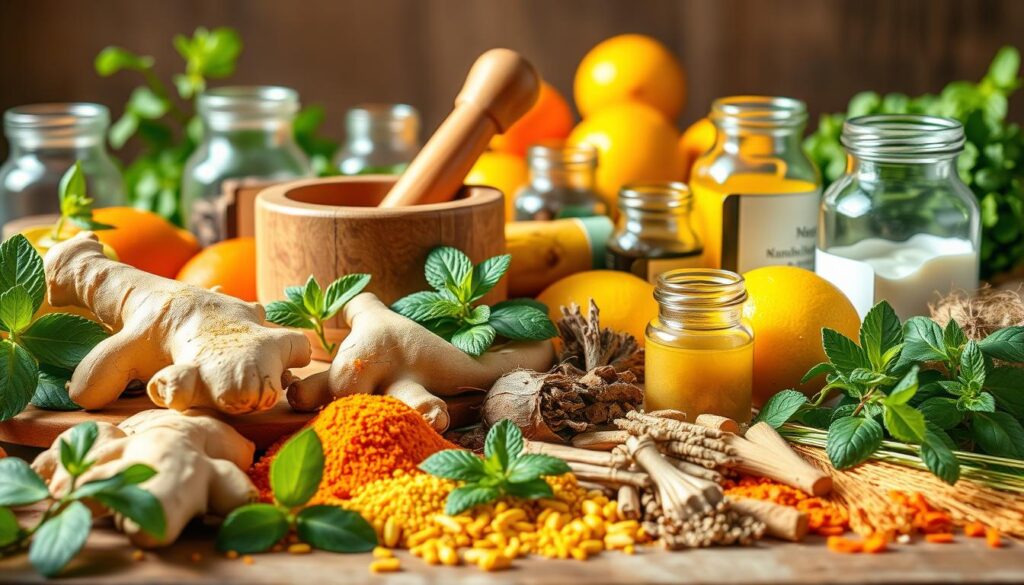
Dealing with digestive problems can be tough. But, alternative medicine has natural solutions to help your gut. Learning about holistic healing can change how you handle digestive issues.
There are many natural remedies for different digestive problems:
- Diarrhea Management
- Bovine colostrum might help treat it
- Lactobacillus acidophilus boosts good gut bacteria
- Quercetin could ease symptoms and improve digestion
- Constipation Relief
- Psyllium is a natural laxative
- Triphala helps with bloating
- Amalaki powder helps with regular bowel movements
Herbal remedies like peppermint oil can lessen stomach pain. The American College of Gastroenterology says it works well for digestive issues.
When looking into alternative medicine for your gut, keep these tips in mind:
- Always talk to a healthcare expert
- Start with small amounts
- Watch how your body reacts
- Think about how you might be sensitive
Holistic healing focuses on solving the root cause with natural remedies. Your journey to better digestion needs time, patience, and a plan that fits you.
Incorporating Healing Herbs Into Your Daily Diet
Adding organic herbs to your diet can be a fun journey to better health. Your digestion can get a big boost by adding healing herbs to your meals.
Finding ways to add digestive herbs to your food is easy. These herbs can make your meals more flavorful and help your health.
Creative Culinary Herb Integration
- Sprinkle bitter herbs like dandelion greens into salads
- Blend digestive herbs into morning smoothies
- Use herbs as seasoning in cooking
- Infuse herbs into cooking oils and vinegars
Recommended Dosages and Timing
Knowing how much herb to take is key to enjoying their benefits. Here’s a simple guide to help you:
| Herb | Daily Dosage | Best Consumption Time |
|---|---|---|
| Ginger | 1-4 grams | Before or with meals |
| Turmeric | 500-2000 mg | With meals containing fat |
| Chamomile | 900-1200 mg | Evening or before bed |
Everyone reacts differently to herbs. Start with small amounts and watch how your body responds. Talking to a healthcare expert can give you advice that fits your health needs.
By adding these organic herbs to your meals, you support your digestive health. You’re also taking a natural approach to wellness.
Conclusion
Natural herbs are powerful for digestive health. They offer a holistic way to support your digestive system. Many people, 80%, use medicinal herbs as natural supplements.
Exploring digestive herbs shows their great potential. Bitter herbs start digestive processes, and plants rich in polyphenols help gut bacteria. This can change how you think about digestive wellness. Almost 72.4% think medicinal herbs are safe, making them a good choice over chemical medicines.
Adding herbal remedies to your routine needs careful thought. While 86% use them a few times a year, it’s important to talk to healthcare professionals. They can help with dosages. Natural herbs can greatly improve your digestive health and overall well-being.
Your journey with natural herbs is just starting. By learning about their unique properties and using them wisely, you can enjoy their benefits. Stay curious, informed, and embrace nature’s healing power.
FAQ
Are natural herbs really effective for improving digestive health?
Yes, natural herbs have been used for centuries to support digestive wellness. Many herbs contain active compounds that can stimulate digestive enzymes, reduce inflammation, soothe the stomach, and promote healthy gut bacteria. Scientific research continues to validate the effectiveness of botanical extracts in supporting digestive function.
How quickly can I expect to see results from using herbal remedies for digestion?
The timeline varies depending on the specific herb and individual health conditions. Some people experience immediate relief from symptoms like bloating or nausea, while others may need consistent use for several weeks to notice significant improvements in overall digestive health.
Can I use herbal remedies if I’m taking other medications?
It’s crucial to consult with a healthcare professional before combining herbal supplements with prescription medications. Some herbs can interact with drugs or affect their absorption. Always disclose your current medications and discuss potential interactions with a qualified healthcare provider.
What are the best herbs for overall digestive support?
Some of the most effective herbs for digestive health include ginger for nausea and inflammation, peppermint for bloating and gas, fennel for digestive comfort, dandelion for stimulating digestive enzymes, and chamomile for soothing the digestive tract.
Are herbal remedies safe for everyone?
While natural herbs are generally safe, they may not be suitable for everyone. Pregnant women, individuals with pre-existing health conditions, and those with allergies should exercise caution. Some herbs can cause side effects or interact with medications, so it’s always best to consult with a healthcare professional before starting any new herbal regimen.
How can I incorporate digestive herbs into my daily routine?
There are multiple ways to use digestive herbs: brewing herbal teas, taking tinctures, using capsules, adding fresh or dried herbs to cooking, creating herbal infusions, or using them as dietary supplements. The method depends on the specific herb and your personal preference.
What are polyphenols, and how do they support digestive health?
Polyphenols are powerful plant compounds that support gut health by feeding beneficial bacteria, reducing inflammation, and promoting a balanced microbiome. They can be found in herbs, fruits, vegetables, and other plant-based foods, offering natural support for digestive wellness.
Can herbal remedies replace traditional medical treatments for digestive issues?
Herbal remedies should be viewed as complementary to, not a replacement for, professional medical care. While they can provide significant support, persistent or severe digestive issues require medical evaluation and potentially professional treatment.
How do I choose high-quality herbal supplements?
Look for organic, sustainably sourced herbs from reputable brands. Check for third-party testing, clear labeling of ingredients, and certifications. Consulting with a healthcare professional or herbalist can help you select the most appropriate and high-quality herbal supplements for your specific needs.
Are there any side effects of using herbal remedies for digestion?
While natural herbs are generally safe, some people may experience mild side effects such as allergic reactions, digestive upset, or interactions with other medications. It’s important to start with low doses, monitor your body’s response, and consult a healthcare professional if you experience any adverse reactions.

